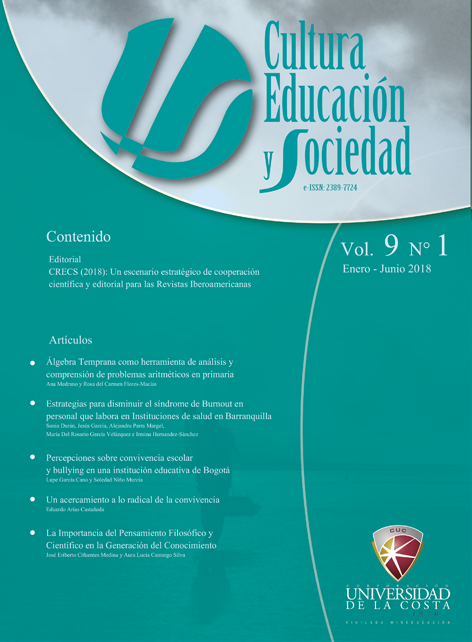Research as a pedagogical strategy for school coexistence
DOI:
https://doi.org/10.17981/cultedusoc.9.1.2018.09Keywords:
Research as a pedagogical strategy; school cohabitation; basic educationAbstract
Research as a pedagogical strategy is an educational methodology that allows directing a learning in context, experimenting forms and styles for the management of knowledge mediated by reflexive moments, promoting the development of competences. The study sought to use research as a pedagogical strategy for school coexistence. It was guided under the qualitative method, from the model of action research, with a descriptive design, the population was conformed by forty (40) students of the sixth grade of the Educational Institution Buenos Aires, of Aracataca - Magdalena. Collection techniques were used such as: individual and institutional rapporteur and field journal. The results show that, in the institution, a deterioration in the school coexistence is observed, for that reason it was necessary to strengthen values, for the personal formation, that is reflected in their personal relationships, oriented to propitiate an integral, democratic education, generating spaces of active participation, through a culture of peace.
Downloads
References
Caballero, M. (2010). Convivencia escolar. Un estudio sobre buenas prácti-cas. Revista Paz y Conflictos. Número 3.
Colombo, G. (2011). Violencia Escolar y Convivencia Escolar: Descubriendo estrategias en la vida cotidiana escolar. Revista Argentina de Sociología, vol. 8-9, núm. 15-16, Consejo de Profesionales en Sociología. Buenos Aires, Argentina.
Gutiérrez, D. & Pérez, E. (2015). Estrategias para generar la convivencia escolar. Ra Ximhai, vol. 11, núm. 1, enero-junio, 2015, pp. 63-81 Universidad Autónoma Indígena de México. El Fuerte, México. Guzmán, E & Preciado, A. (2012). La convivencia escolar: una mirada desde la diversidad cultural. Tesis de Maestría, Universidad de Manizales. Caldas, Manizales.
Herrera Tapias, B. (2013). La constitucio-nalización de los derechos del consumidor en Colombia: un análisis desde los derechos sociales fundamentales. Civilizar. Ciencias Sociales y Humanas, 13 (25), 33-47. Ley 1620 de 2013. Guías pedagógicas para la convivencia escolar. Sistema Nacional de Convivencia Escolar. Ministerio de Educación Nacional.
López, C., Carvajal, C., Soto M., & Urrea, P. (2013). Factores asociados a la con-vivencia escolar en adolescentes. Rev. Educación y Educadores vol.16 no.3 Pag.383-410.
Mariño, G. (2010). El diálogo en la educación de jóvenes y adultos. Dos propuestas pedagógicas para implementarlo. En el taller dialógico/la recuperación de experiencias laborales. Bogotá. OEI.
Mejía, M., & Manjarrés, M. (2010). Las pedagogías fundadas en la investigación. Búsquedas en la reconfiguración de la educación. Revista Internacional Magisterio 42: 16-26. Colombia.
Mendoza, A. (2015). Propuesta de convivencia escolar a través de talleres de prevención de violencia escolar con perspectiva de género. Cultura Educación y Sociedad, 6(2).
Ortega, P., Peñuela, D & López, D. (2009). Sujetos y prácticas de la pedagogía crítica. Ediciones El Búho. Bogotá. Ortega, R. (2015). La Convivencia Escolar: qué es y cómo abordarla. Conse-jería de Educación y Ciencia.
Pérez, G. (2012). Competencias o pensamiento práctico. La construcción de los significados de representación y de acción. Educar por competencias ¿qué hay de nuevo? (2aed., pp. 59-102). Madrid, España: Ediciones Morata.
Picardo, O., Balmore, R., & Escobar, J. (2004). Diccionario enciclopédico de ciencias de la educación. San Salvador: El Salvador.
Silva Peña, Ilich (2012). Investigación-Acción Realizada por Docentes Chilenos como una vía para su Desarrollo Profesional: Caracterización de dos experiencias. Paradigma 33 (1): 27-44.
Downloads
Published
How to Cite
Issue
Section
License
Copyright (c) 2018 CULTURA EDUCACIÓN Y SOCIEDAD

This work is licensed under a Creative Commons Attribution-NonCommercial-NoDerivatives 4.0 International License.
![]()
Creative Commons 2020 CULTURA EDUCACIÓN Y SOCIEDAD
This article is under international license Creative Commons Reconocimiento-NoComercial-SinObrasDerivadas 4.0.
The published articles are the sole responsibility of their authors and do not necessarily reflect the opinions of the editorial committee.
CULTURA EDUCACIÓN Y SOCIEDAD respects the moral rights of its authors, who assign to the editorial committee the patrimonial rights of the published material. In turn, the authors inform that this work is unpublished and has not been previously published.
All articles are under a:
Licencia Creative Commons Atribución-NoComercial-SinDerivadas 4.0 Internacional.
![]()


 English
English
 Español (España)
Español (España)




_12.53_.27_p_. m_._3.png)





_12.57_.35_p_. m_._3.png)
_12.50_.37_p_. m_._3.png)



